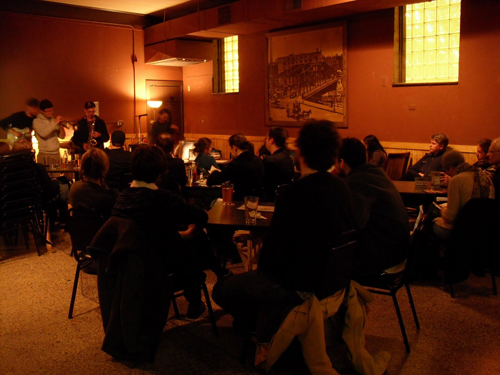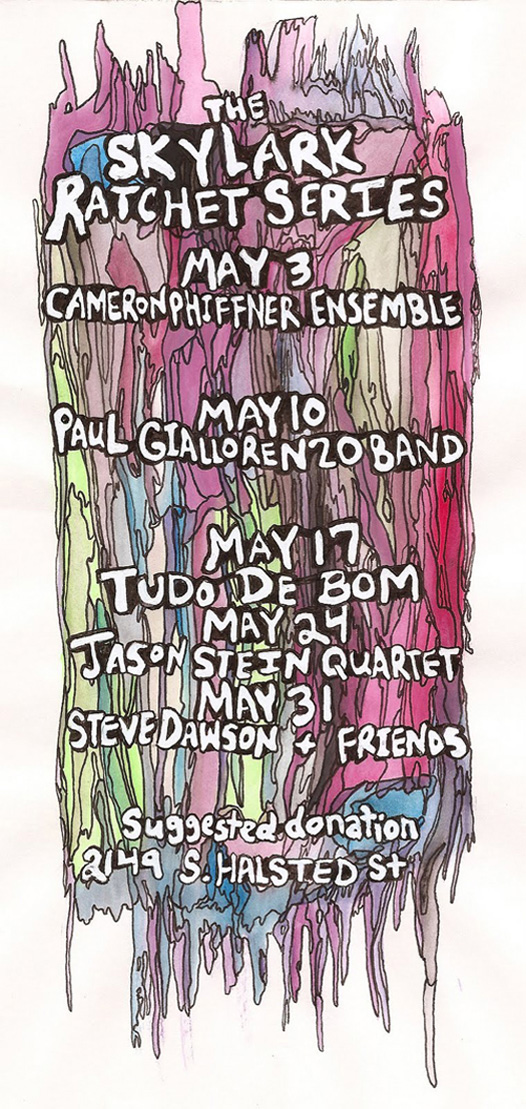| « Max Weinberg and The Max Weinberg...Big Band? | Friday Quick Links » |
Feature Thu May 06 2010
Ratchet: Pushing Jazz Forward
 Sure you know about Chicago jazz venues like the Green Mill, Andy's and Fred Anderson's Velvet Lounge, but what about Hungry Brain, Hideout, or even Skylark? Chicago has a rich history of jazz, from the speakeasies of the '20s, to a thriving community of innovators that exists today. Ratchet, taking place Monday nights at the Skylark in Pilsen, is a jazz series in the vein of Umbrella Music, Immediate Sound, and Elastic Arts, which are collectives and series in this small, but visionary creative music community.
Sure you know about Chicago jazz venues like the Green Mill, Andy's and Fred Anderson's Velvet Lounge, but what about Hungry Brain, Hideout, or even Skylark? Chicago has a rich history of jazz, from the speakeasies of the '20s, to a thriving community of innovators that exists today. Ratchet, taking place Monday nights at the Skylark in Pilsen, is a jazz series in the vein of Umbrella Music, Immediate Sound, and Elastic Arts, which are collectives and series in this small, but visionary creative music community.
The name Ratchet is a reference to a "machine or mechanism that can only move forward, relentlessly — like the tradition of creative music and art in general," says Ratchet founder Frank Rosaly. The tradition of jazz has always been to push the line. While traditional standards from the "jazz age" of the twenties may sound like tame oldies to us now, at the time it certainly pushed the boundaries of what was acceptable, both musically and socially. Jazz in those days was widely considered immoral and vulgar due in part to the fact that most jazz clubs doubled as speakeasies, not to mention its connotations with sex.

Marc Riordan and The High Life perform at Ratchet at the Skylark
(photo courtesy Ratchet's photo website)
But you won't hear straight-ahead standards here. The idea is to showcase "music with improvisational roots," says Rosaly. "We're trying to book people that interpret jazz with foresight and balls." A lot of creative music series require that performers present completely improvised or original material, but Ratchet is more lax in that they just ask that musicians put their own personal spin on whatever they play. For example, Keefe Jackson recently played a night of jazz standards, but "he's such an individualistic player, he really treats them in such a special way," Rosaly says. "Keefe does something with the tunes it makes sense for what we're trying to present. It's still reaching."
Although Rosaly spearheaded the inception of the series, he has since brought on several other musicians who now join him in the role of curator which include Marc Riordan, Jeff Kimmel, Ben Boye and Nick Mazzarella. How they came together is representative of just how connected the creative music community in Chicago really is. Everyone for the most part knows everyone, and they all support one another and the work they are doing. "There are [only] a handful of venues that host weekly creative music events, so we all encounter each other sooner or later," says Boye.
Ratchet originally began as a bi-weekly gig in the summer of '07 for the avant garde trio Princess Princess, with Rosaly on drums, Jaimie Branch on trumpet and Toby Summerfield on bass. The band was a rather challenging listen, especially in an unforgiving bar scene, and the group was eventually fired. But during the process, Rosaly took the reins and somehow convinced the management to let them try a weekly series, this time with different bands each week. "As long as it ain't Princess Princess every week, we'll try it out." They gave Ratchet six months—and that was almost three years ago.
But those three years haven't been without struggle. The first, most obvious obstacle is the room. At most improvised music events, the work being presented is regarded as art and it is considered rude to talk during the performance. Skylark is first and foremost a bar, not a listening room, which poses a challenge when booking. They have to cater to the room by not booking a group that would be too soft, too loud, or challenging. Booking so far has mostly been free jazz and some free improvisation, with some experimental stuff, but "we try not to overload the joint with super loud freakers," says Rosaly. That said, diversity in the lineup has been a bit of a challenge. While it hasn't been particularly difficult to book artists each week; "there are a lot of musicians who just want an opportunity to play," but "a lot of the bands we want to present and who would draw a crowd consistently aren't ok with playing a room where people aren't cool to talk rather than yell," says Rosaly.
One thing that has helped immensely was moving the performance area from the stage at the front to the back of the room. It used to feel forced, people would have to walk right in front of the band to go to the bar or to go outside and grab a smoke. Now the bar is separated into two distinct sections. You can sit and listen to music if you want, or you can hang at the bar. Plus, there are outlets in the ceiling suggesting that once upon a time the back area was meant to be a stage, and they have plans to take advantage of that by adding lighting.
Another issue has been promotion. Although they list the schedule on their blog and Facebook page, and get some promotion through the website All About Jazz, it's still tough to get the word out. They have recently made another addition to the group, Christine Ciarleglio, to help with just that. A visual artist with experience in promotions, Ciarleglio will design handbills and posters announcing the monthly lineup, among other plans (see May's poster below).

On the plus side, the series has gained a reputation with age, and the culture of the bar on Monday nights has started to change. They get more and more regulars coming out specifically for the music, and patrons have shown interest and asked questions about the series. And as the name suggests, Ratchet continues to move forward. There are plans in the works to hold a two-day festival in December that would celebrate the series' third anniversary. While just a seed right now, the idea is to largely feature bands that frequently play the series, plus (without naming names) some out of town guests. There is also a little something in the works for a monthly event at new dining spot Longman & Eagle.
All of which Rosaly (who recently released a record of his own titled Milkwork on the Contraphonic label) can be proud of. He told me he looks at Ratchet as his way of giving back to the community that cultivated him when he first arrived in Chicago in 2001 as a fresh out of school jazz musician, not knowing much at all about improvised music. On the Monday that I attended, I was struck by the excitement of everyone involved, from the curators (who are in attendance every week) to the performing musicians. It was an especially slow night, but the band didn't seem to mind. At the end of the night as they were loading out their gear, Frank apologized for not being able to offer a larger payment, but they shrugged it off; "I'm just happy to play," said one, "I love doing this gig," said another.
This feature is supported in part by a Community News Matters grant from The Chicago Community Trust and the John S. and James L. Knight Foundation. More information.















